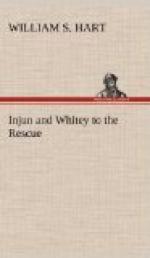“That’s what I’m thinkin’,” said Bill Jordan. “An’ seein’ as how Injun’s uncle was old Rain-in-the-Face, an’ seein’ as how th’ old man’s fingers was all stubbed off at th’ ends, an’ seein’ as how Lonesome Charlie Reynolds, th’ greatest scout what ever lived, was a great friend of th’ Injuns, an’ spoke their langwidge, an’ seein’ as how he was scout for General Terry, up at old Fort Buford, an’ seein’ as how that’s where th’ Seventh Cavalry was quartered, an’ seein’ as how Captain Tom Custer was always hated by th’ Sioux, an’ by old Rain-in-the-Face in partic’ler—by golly, boys!—”
Bill paused, as he and the men were impressed by the important point to which his line of argument was leading, then went on excitedly: “We only have t’ reason deflectively t’ put our fingers on th’ button what caused th’ doggonedest Injun fights this country ever knowed!”
“It begins, gee whiz! it begins—we all are all right, boys! It begins in ‘75, with Injun’s tribe. An’ in ‘76, General Custer an’ Captain Tom Custer an’ two hundred an’ sixty-one o’ their men was all wiped out. An’ them Injuns kep’ right on fightin’ till ‘81, when John Gall, th’ big Sioux Chief, surrenders at that big fight in th’ snow, when it was fifty-two below, an’ them Injuns was fightin’ in their skins, with no coverin’ but a blanket.
“Just think of it, boys. An’ sittin’ right here in this bunk house, years an’ years after, us cowpunchers get th’ real cause o’ th’ whole rumpus, which them Washington folks has bin figurin’ out for years, an’ couldn’t do it none whatever. Didn’t I tell you all when a Injun talks he says somethin’?”
There was no disputing this, and the men looked solemn as they considered the series of great tragedies and the chain of circumstances which had led up to them. Then, as the impression made on Bill Jordan began to fade, and thoughts of his own importance to take its place, he turned triumphantly to Jim Walker.
“Well, did I make Injun talk, an’ do we get them peaches?” Bill demanded.
“You make him talk!” Jim returned scornfully. “All you did was t’ make him shut up. Whitey made him talk.”
“G’wan,” Bill retorted. “Didn’t them suggestions o’ mine ’bout white men an’ Injuns start him thinkin’ ‘bout that bad White Chief hombre? An’ didn’t I get rid o’ Henry Dorgan, ‘cause Injun’s distrustful of him, an’ wouldn’t chin with him ’round?”
“‘F y’ask for my opinion, I don’t b’lieve none o’ you made him talk,” said Shorty Palmer. “I think he just—”
“I didn’t ask for your opinion,” Bill interrupted. “No feller c’n tell me nothin’ ’bout Injuns—”
But if this bunk house argument were followed to its end I should have to write another book. Perhaps you can guess who paid for the peaches.
CHAPTER IX
FISH-HOOKS AND HOOKY
After breakfast the next morning when Injun and Whitey came out of the ranch house, Whitey was heavy-hearted. The thought of going to that school at the Forks was the cause of his depression. It was like some sort of penalty one must pay for being a boy. Injun was to escort Whitey to the school, as an act of friendship—as one might go to another’s funeral.




